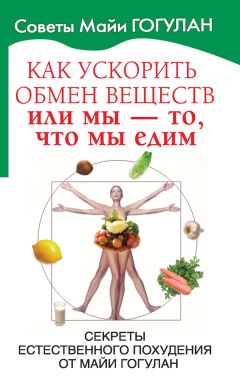26. J. Cools, D. Е. Schotte, and R. J. McNally, “Emotional Arousal and Overeating in Restrained Eaters”, Journal of Abnormal Psychology 101, no. 2 (May 1992): 348-51.
27. A. Janet Tomiyama, Traci Mann, and Lisa Comer, “Triggers of Eating in Everyday Life”, Appetite 52, no. 1 (2009): 72-82.
28. Результаты 83 разных исследований приводятся в работе: Martin S. Hagger et al., “Ego Depletion and the Strength Model of Self-Control: A Meta-Analysis”, Psychological Bulletin 136, no. 4 (July 2010): 495-525, doi:10.1037/a0019486.
29. О первом исследовании этого феномена см.: Roy F. Baumeister et al., “Ego Depletion: Is the Active Self a Limited Resource?”, Journal of Personality and Social Psychology 74, no. 5 (1998): 1252-65, doi: 10.1037/0022-3514.74.5.1252.
30. Все данные взяты из работы: Hagger et al., “Ego Depletion and the Strength Model of Self-Control: A Meta-Analysis”.
31. О множестве недостатков наличия слишком большого выбора см.: Barry Schwartz, “The Paradox of Choice” (New York: Ecco, 2003)[25].
32. S. S. Iyengar and M. R. Lepper, “When Choice Is Demotivating: Can One Desire Too Much of a Good Thing?”, Journal of Personality and Social Psychology 79y no. 6 (December 2000): 995-1006.
33. Kathleen D. Vohs et al., “Making Choices Impairs Subsequent Self-Control: A Limited-Resource Account of Decision Making, Self-Regulation, and Active Initiative”, Journal of Personality and Social Psychology 94, no. 5 (May 2008): 883-98, doi: 10.1037/0022-3514.94.5.883.
34. Michael Lewis, “Obama’s Way”, Vanity Fair, 2012.
35. В качестве примера см.: Roy F. Baumeister and John Tierney, “Willpower: Rediscovering the Greatest Human Strength” (New York: Penguin Books, 2012).
36. На мой взгляд, упомянутая тема не является первостепенной в перечисляемых далее работах. В описываемых в них исследованиях участников не учили саморегулированию; вместо этого их просили следить за своей осанкой или заняться физическими упражнениями на постоянной основе, а потом доказывали, что испытуемым лучше удавался контроль в какой-нибудь совершенно иной сфере. Более того, методология этих работ довольно запутанная, нужно потратить не один час, чтобы разобраться в ней. М. Muraven, R. F. Baumeister, and D. М. Tice, “Longitudinal Improvement of Self-
Regulation Through Practice: Building Self-Control Strength Through Repeated Exercise”, Journal of Social Psychology 139, no. 4 (August 1999): 446-57, doi: 10.1080/00224549909598404; Megan Oaten and Ken Cheng, “Improved Self-Control: The Benefits of a Regular Program of Academic Study”, Basic and Applied Social Psychology 28, no. 1 (April 2006): 1-16, doi:10.1207/sl5324834basp2801_l; Megan Oaten and Ken Cheng, “Longitudinal Gains in Self-Regulation from Regular Physical Exercise”, British Journal of Health Psychology 11, Pt. 4 (November 2006): 717-33, doi: 10.1348/135910706X96481.
37. Эту поговорку я узнала от Денизы де Риддер, исследовательницы самоконтроля из Нидерландов. Поговорка встречается и в гаэльском языке[26].
38. Для ознакомления с примерами см.: Wilhelm Hofmann et al., “Everyday Temptations: An Experience Sampling Study of Desire, Conflict, and Self-Control”, Journal of Personality and Social Psychology 102, no. 6 (June 2012): 1318-35, doi:10.1037/a0026545.
ГЛАВА 4. ДИЕТЫ ВРЕДНЫ
1. Информация об этом исследовании взята из книги: Keys et al., “The Biology of Human Starvation”, vols. 1 and 2.
2. Там же, с. 810. Кис отсылает нас к работе: A. W. Greely, “Three Years of Arctic Service: An Account of the Lady Franklin Bay Expedition of 1881-1884 and the Attainment of the Farthest North” (New York: Scribner, 1886).
3. Keys et al., “The Biology of Human Starvation”, vols. 1 and 2, p. 811. Здесь Кис также делает отсылку к Грили.
4. Там же.
5. Человека, съевшего свои ботинки, звали Джон Франклин, и впоследствии он за это поплатился. Anthony Brandt, “The Man Who Ate His Boots: The Tragic History of the Search for the Northwest Passage” (New York: Knopf, 2010).
6. Keys et al., “The Biology of Human Starvation”, vols. 1 and 2, p. 776. Цитата взята из работы Киса, в свою очередь ссылающегося на чешскую работу, доступа к которой у меня нет (как и навыков чтения на чешском). J. Stavel, “Hlad: Prispevek К Analyse Pudu” (Bratislava: Philosophy Faculty, Comenius University, 1936).
7. По этой причине некоторые считают некорректным говорить о том, что участники эксперимента просто соблюдали диету, — скорее, они были помещены в условия близкие к тем, в которых находятся больные пищевыми расстройствами, в частности анорексией.
8. Stephen Smith, “Battles of Belief in World War II”, American Radioworks, 2013, http://americanradioworks.publicradio.org/features/wwii/ transcript.html.
9. Исключение составляют результаты тестов, которые испытуемые активно выполняли до эксперимента. Участники хорошо справлялись с ними даже в период голодания, иными словами: последствия истощения могут быть незаметны на примере привычных действий.
10. Michael W. Green and Nicola A. Elliman, “Are Dieting-Related Cognitive Impairments a Function of Iron Status?”, British Journal of Nutrition 109, no. 1 (January 14, 2013): 184-92, doi:10.1017/S0007114512000864.
11. M. W. Green et al., “Impairment of Cognitive Performance Associated with Dieting and High Levels of Dietary Restraint”, Physiology & Behavior 55, no. 3 (March 1994): 447-52; Michael W. Green and Peter J. Rogers, “Impairments in Working Memory Associated with Spontaneous Dieting Behaviour”, Psychological Medicine 28, no. 5 (September 1, 1998): 1063-70; Jacqueline Shaw and Marika Tiggemann, “Dieting and Working Memory: Preoccupying Cognitions and the Role of the Articulatory Control Process”, British Journal of Health Psychology 9, Pt. 2 (May 2004): 175-85, doi: 10.1348/135910704773891032; Louise Vreugdenburg, Janet Bryan, and Eva Kemps, “The Effect of Self-Initiated Weight-Loss Dieting on Working Memory: The Role of Preoccupying Cognitions”, Appetite 41, no. 3 (2003): 291-300; P. J. Rogers and M. W. Green, “Dieting, Dietary Restraint and Cognitive Performance”, British Journal of Clinical Psychology 32, Pt. 1 (February 1993): 113-16.
12. Green and Rogers, “Impairments in Working Memory Associated with Spontaneous Dieting Behaviour”; Eva Kemps, Marika Tiggemann, and Kelly Marshall, “Relationship between Dieting to Lose Weight and the Functioning of the Central Executive”, Appetite 45, no. 3 (2005): 287-94; Eva Kemps and Marika Tiggemann, “Working Memory Performance and Preoccupying Thoughts in Female Dieters: Evidence for a Selective Central Executive Impairment”, British Journal of Clinical Psychology 44, Pt. 3 (September 2005): 357-66, doi: 10.1348/014466505X35272; Vreugdenburg, Bryan, and Kemps, “The Effect of Self-Initiated Weight-Loss Dieting on Working Memory”.
13. Nicola Jones and Peter J. Rogers, “Preoccupation, Food, and Failure: An Investigation of Cognitive Performance Deficits in Dieters”, International Journal of Eating Disorders 33, no. 2 (March 2003): 185-92, doi: 10.1002/eat.l0124.
14. Michael W. Green and Peter J. Rogers, “Impaired Cognitive Functioning during Spontaneous Dieting”, Psychological Medicine 25, no. 05 (July 9, 1995): 1003, doi:10.1017/S0033291700037491; Kemps, Tiggemann, and Marshall, “Relationship between Dieting to Lose Weight and the Functioning of the Central Executive”; Vreugdenburg, Bryan, and Kemps, “The Effect of Self-Initiated Weight-Loss Dieting on Working Memory”.
15. Статья, в которой цитируется Ванесса Энгль: Ermine Saner, “The Fat Controllers”, Guardian, August 8, 2013.
16. Kemps, Tiggemann, and Marshall, “Relationship between Dieting to Lose Weight and the Functioning of the Central Executive”; Kemps and Tiggemann, “Working Memory Performance and Preoccupying Thoughts in Female Dieters”; Vreugdenburg, Bryan, and Kemps, “The Effect of Self-Initiated Weight-Loss Dieting on Working Memory”.
17. Jones and Rogers, “Preoccupation, Food, and Failure”.
18. Green and Rogers, “Impaired Cognitive Functioning during Spontaneous Dieting”; Kemps and Tiggemann, “Working Memory Performance and Preoccupying Thoughts in Female Dieters”; Kemps, Tiggemann, and Marshall, “Relationship between Dieting to Lose Weight and the Functioning of the Central Executive”; Vreugdenburg, Bryan, and Kemps, “The Effect of Self-Initiated Weight-Loss Dieting on Working Memory”.
19. Green and Rogers, “Impaired Cognitive Functioning during Spontaneous Dieting”.
20. Hirsch, “Obesity: Matter over Mind”.
21. Kathleen D. Vohs and Brandon J. Schmeichel, “Self-Regulation and Extended Now: Controlling the Self Alters the Subjective Experience of Time”, Journal of Personality and Social Psychology 85 (2003): 217-30.
22. He исключено, что автор этого изречения — я сама. Я высказывала его на протяжении многих лет. Перерыв весь Интернет, я так и не смогла его обнаружить.
23. A. Janet Tomiyama et al., “Low Calorie Dieting Increases Cortisol”, Psychosomatic Medicine 72, no. 4 (May 2010): 357-64, doi: 10.1097/ PSY.0b013e3181d9523c. См. также: Michael W. Green, Nicola A. Elliman, and Mary J. Kretsch, “Weight Loss Strategies, Stress, and
Cognitive Function: Supervised versus Unsupervised Dieting”, Psychoneuroendocrinology 30, no. 9 (2005): 908-18.
24. Все, что я рассказываю о стрессе в этом и следующем абзацах, подробнее описывается в замечательной книге: Robert Sapolsky, “Why Zebras Don’t Get Ulcers”, 3rd ed.
25. A. Janet Tomiyama et al., “Does Cellular Aging Relate to Patterns of Allostasis? An Examination of Basal and Stress Reactive HPA Axis Activity and Telomere Length”, Physiology & Behavior 106, no. 1 (April 12, 2012): 40—45, doi:10.1016/j.physbeh.2011.11.016.
26. Amy Kiefer et al., “Dietary Restraint and Telomere Length in Pre-and Post-Menopausal Women”, Psychosomatic Medicine 70, no. 8 (October 1, 2008): 845-49, doi:10.1097/PSY.0b013e318187d05e.
27. David Gal and Wendy Liu, “Grapes of Wrath: The Angry Effects of Self-Control”, Journal of Consumer Research 38, no. 3 (2011): 445-58.
28. Keys et al., “The Biology of Human Starvation”, vols. 1 and 2, p. 907.
29. Smith, “Battles of Belief in World War II”.
30. Thomas A. Wadden et al., “Dieting and the Development of Eating Disorders in Obese Women: Results of a Randomized Controlled Trial”, American Journal of Clinical Nutrition 80, no. 3 (September 1, 2004): 560-68; Diann M. Ackard, Jillian K. Croll, and Ann Kearney-Cooke, “Dieting Frequency among College Females: Association with Disordered Eating, Body Image, and Related Psychological Problems”, Journal of Psychosomatic Research 52, no. 3 (2002): 129-36; F. M. Cachelin and P. C. Regan, “Prevalence and Correlates of Chronic Dieting in a Multi-Ethnic U.S. Community Sample”, Eating and Weight Disorders 11, no. 2 (June 1, 2006): 91-99; Scott Crow et al., “Psychosocial and Behavioral Correlates of Dieting among Overweight and Non-Overweight Adolescents”, Journal of Adolescent Health 38, no. 5 (2006): 569-74; Meghan M. Gillen, Charlotte N. Markey, and Patrick M. Markey, “An Examination of Dieting Behaviors among Adults: Links with Depression”, Eating Behaviors 13, no. 2 (2012): 88-93; T. A. Wadden, A. J. Stunkard, and J. W. Smoller, “Dieting and Depression: A Methodological Study”, Journal of Consulting and Clinical Psychology 54, no. 6 (1986): 869.
31. Работа обзорного характера по теме: Rena R. Wing et al., “Mood Changes in Behavioral Weight Loss Programs”, Journal of Psychosomatic Research 28, no. 3 (1984): 189-96.
32. Там же.
33. Работа обзорного характера по теме: Jordan W. Smoller, Thomas А. Wadden, and Albert J. Stunkard, “Dieting and Depression: A Critical Review”, Journal of Psychosomatic Research 31, no. 4 (1987): 429-40.
34. Dacher Keltner, “Evidence for the Distinctness of Embarrassment, Shame, and Guilt: A Study of Recalled Antecedents and Facial Expressions of Emotion”, Cognition & Emotion 10, no. 2 (March 1996): 155-72, doi: 10.1080/026999396380312.
35. Ben C. Fletcher et al., “How Visual Images of Chocolate Affect the Craving and Guilt of Female Dieters”, Appetite 48, no. 2 (2007): 211-17; Gillian A. King, C. Peter Herman, and Janet Polivy, “Food Perception in Dieters and Non-Dieters”, Appetite 8, no. 2 (1987): 147-58.
36. B. Wansink, M. Cheney, and N. Chan, “Exploring Comfort Food Preferences Across Age and Gender”, Physiology & Behavior 79, nos. 4-5 (September 2003): 739-47, doi: 10.1016/S0031-9384(03)00203-8.
37. Michael Prager, “I Don’t Consider Fatness a Problem”, MichaelPrager. com/blog, 2013, http://michaelprager.com/content/i-dont-consider-fatness-problem-Deb-Burgard-Health-At-Every-Size.





